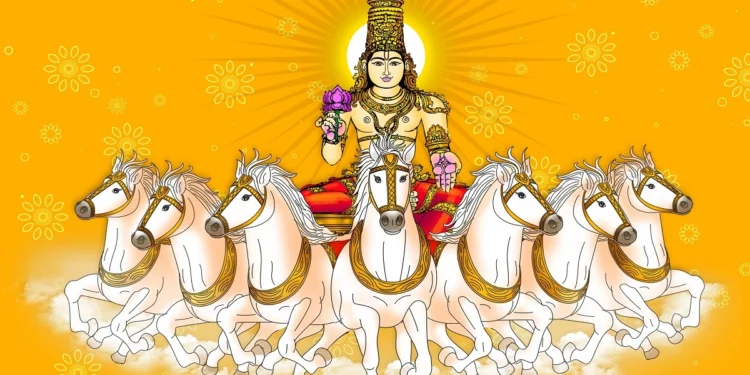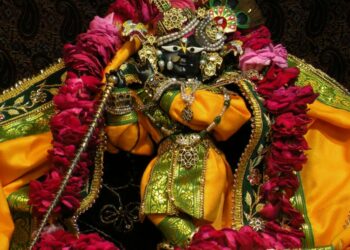TEXT 40
ajñaś cāśraddadhānaś ca
saṁśayātmā vinaśyati
nāyaṁ loko ‘sti na paro
na sukhaṁ saṁśayātmanaḥ
SYNONYMS
ajñaḥ—a fool who has no knowledge in standard scriptures; ca—and; aśraddadhānaḥ—without faith in revealed scriptures; ca—also; saṁśaya—of doubts; ātmā—a person; vinaśyati—falls back; na—never; ayam—in this; lokaḥ—world; asti—there is; na—nor; paraḥ—in the next life; na—not; sukham—happiness; saṁśaya—doubtful; ātmanaḥ—of the person.
TRANSLATION
But ignorant and faithless persons who doubt the revealed scriptures do not attain God consciousness; they fall down. For the doubting soul there is happiness neither in this world nor in the next.
PURPORT
Out of many standard and authoritative revealed scriptures, the Bhagavad-gītā is the best. Persons who are almost like animals have no faith in, or knowledge of, the standard revealed scriptures; and some, even though they have knowledge of, or can cite passages from, the revealed scriptures, have actually no faith in these words. And even though others may have faith in scriptures like Bhagavad-gītā, they do not believe in or worship the Personality of Godhead, Śrī Kṛṣṇa. Such persons cannot have any standing in Kṛṣṇa consciousness. They fall down. Out of all the above-mentioned persons, those who have no faith and are always doubtful make no progress at all. Men without faith in God and His revealed word find no good in this world, nor in the next. For them there is no happiness whatsoever. One should therefore follow the principles of revealed scriptures with faith and thereby be raised to the platform of knowledge. Only this knowledge will help one become promoted to the transcendental platform of spiritual understanding. In other words, doubtful persons have no status whatsoever in spiritual emancipation. One should therefore follow in the footsteps of great ācāryas who are in the disciplic succession and thereby attain success.
TEXT 41
yoga-sannyasta-karmāṇaṁ
jñāna-sañchinna-saṁśayam
ātmavantaṁ na karmāṇi
nibadhnanti dhanañjaya
SYNONYMS
yoga—by devotional service in karma—yoga; sannyasta—one who has renounced; karmāṇam—the fruits of actions; jñāna—by knowledge; sañchinna—cut; saṁśayam—doubts; ātma-vantam—situated in the self; na—never; karmāṇi—works; nibadhnanti—do bind; dhanam-jaya—O conqueror of riches.
TRANSLATION
One who acts in devotional service, renouncing the fruits of his actions, and whose doubts have been destroyed by transcendental knowledge, is situated factually in the self. Thus he is not bound by the reactions of work, O conqueror of riches.
PURPORT
One who follows the instruction of the Bhagavad-gītā, as it is imparted by the Lord, the Personality of Godhead Himself, becomes free from all doubts by the grace of transcendental knowledge. He, as a part and parcel of the Lord, in full Kṛṣṇa consciousness, is already established in self-knowledge. As such, he is undoubtedly above bondage to action.
TEXT 42
tasmād ajñāna-sambhūtaṁ
hṛt-sthaṁ jñānāsinātmanaḥ
chittvainaṁ saṁśayaṁ yogam
ātiṣṭhottiṣṭha bhārata
SYNONYMS
tasmāt—therefore; ajñāna—sambhūtam—born of ignorance; hṛt—stham—situated in the heart; jñāna—of knowledge; asinā—by the weapon; ātmanaḥ—of the self; chittvā—cutting off; enam—this; saṁśayam—doubt; yogam—in yoga; ātiṣṭha—be situated; uttiṣṭha—stand up to fight; bhārata—O descendant of Bharata.
TRANSLATION
Therefore the doubts which have arisen in your heart out of ignorance should be slashed by the weapon of knowledge. Armed with yoga, O Bhārata, stand and fight.
PURPORT
The yoga system instructed in this chapter is called sanātana-yoga, or eternal activities performed by the living entity. This yoga has two divisions of sacrificial actions: one is called sacrifice of one’s material possessions, and the other is called knowledge of self, which is pure spiritual activity. If sacrifice of one’s material possessions is not dovetailed for spiritual realization, then such sacrifice becomes material. But one who performs such sacrifices with a spiritual objective, or in devotional service, makes a perfect sacrifice. When we come to spiritual activities, we find that these are also divided into two: namely, understanding of one’s own self (or one’s constitutional position), and the truth regarding the Supreme Personality of Godhead. One who follows the path of Bhagavad-gītā as it is can very easily understand these two important divisions of spiritual knowledge. For him there is no difficulty in obtaining perfect knowledge of the self as part and parcel of the Lord. And such understanding is beneficial, for such a person can easily understand the transcendental activities of the Lord. In the beginning of this chapter, the transcendental activities of the Lord were discussed by the Supreme Lord Himself. One who does not understand the instructions of the Gītā is faithless, and is to be considered to be misusing the fragmental independence awarded to him by the Lord. In spite of such instructions, one who does not understand the real nature of the Lord as the eternal, blissful, all-knowing Personality of Godhead is certainly fool number one. Ignorance can be removed by gradual acceptance of the principles of Kṛṣṇa consciousness. Kṛṣṇa consciousness is awakened by different types of sacrifices to the demigods, sacrifice to Brahman, sacrifice in celibacy, in household life, in controlling the senses, in practicing mystic yoga, in penance, in forgoing material possessions, in studying the Vedas, and in partaking of the social institution called varṇāśrama-dharma. All of these are known as sacrifice, and all of them are based on regulated action. But within all these activities, the important factor is self-realization. One who seeks that objective is the real student of Bhagavad-gītā, but one who doubts the authority of Kṛṣṇa falls back. One is therefore advised to study Bhagavad-gītā, or any other scripture, under a bona fide spiritual master, with service and surrender. A bona fide spiritual master is in the disciplic succession from time eternal, and he does not deviate at all from the instructions of the Supreme Lord as they were imparted millions of years ago to the sun-god, from whom the instructions of Bhagavad-gītā have come down to the earthly kingdom. One should, therefore, follow the path of Bhagavad-gītā as it is expressed in the Gītā itself and beware of self-interested people after personal aggrandizement who deviate others from the actual path. The Lord is definitely the supreme person, and His activities are transcendental. One who understands this is a liberated person from the very beginning of his study of Bhagavad-gītā.
Thus end the Bhaktivedanta Purports to the Fourth Chapter of the Śrīmad Bhagavad-gītā in the matter of Transcendental Knowledge.



















